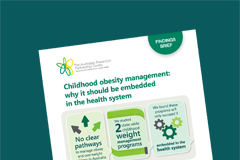Why childhood overweight management needs a place in the health system
Without a clear position in the health care system, childhood overweight and obesity management programs are vulnerable to external factors like changes in funding priorities. Download this Findings Brief PDF to learn how this project identified barriers and enablers to the universal availability of childhood obesity management services.
Key messages
- Childhood obesity is a key health challenge in Australia and around the world.
- In Australia, there is no national universal public health service for families of children who are already overweight or obese, despite well-established evidence about the effectiveness of these services.
- The project identified barriers and enablers to the universal availability of childhood obesity management services through examining two state-wide programs, Go4Fun® in NSW and PEACH™ in Queensland.
- The project found that childhood overweight and obesity management programs will only succeed long term if they are embedded into the health care system.
- Without a clear position in the health care system – whether as prevention, treatment or part of universal health care – programs are vulnerable to external factors such as changes ingovernment, funding priorities and philosophical differences.
